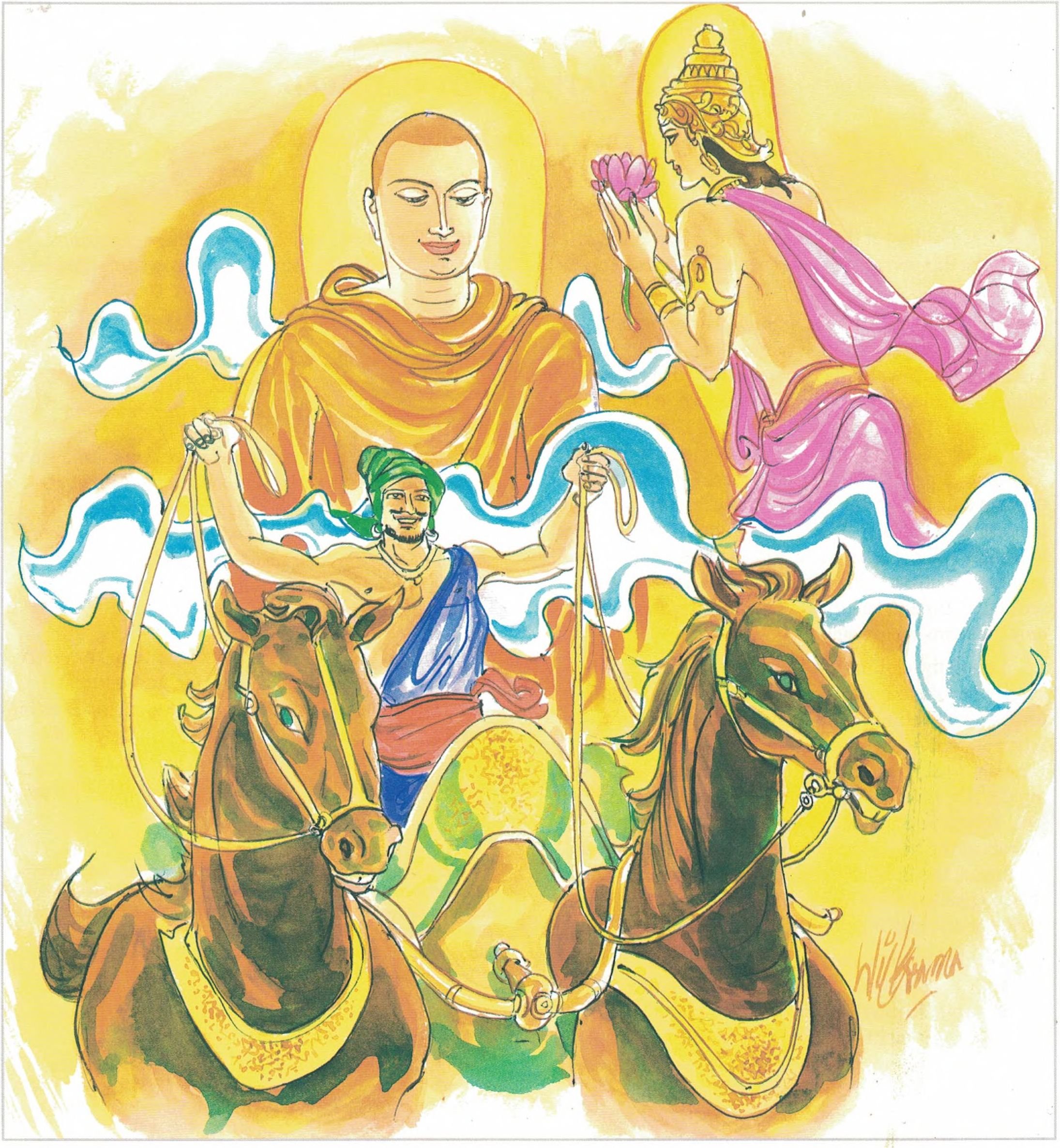Dhammapada (Illustrated)
by Ven. Weagoda Sarada Maha Thero | 1993 | 341,201 words | ISBN-10: 9810049382 | ISBN-13: 9789810049386
This page describes The Story of Venerable Mahakaccayana which is verse 94 of the English translation of the Dhammapada which forms a part of the Sutta Pitaka of the Buddhist canon of literature. Presenting the fundamental basics of the Buddhist way of life, the Dhammapada is a collection of 423 stanzas. This verse 94 is part of the Arahanta Vagga (The Saints) and the moral of the story is “He whose senses are guarded like trained horses, is pure and humble, is adored even by gods”.
Verse 94 - The Story of Venerable Mahākaccāyana
Pali text, illustration and English translation of Dhammapada verse 94:
yass'indriyāni samathaṃ gatāni assā yathā sārathinā sudantā |
pahīṇamānassa anāsavassa devā'pi tassa pihayanti tādino || 94 ||
94. Whose faculties are pacified as steeds by charioteer well-tamed, with pride abandoned, unpolluted, to even devas this One’s dear.
 He whose senses are guarded like trained horses, is pure and humble, is adored even by gods. |
The Story of Venerable Mahākaccāyana
While residing at the Pubbārāma Monastery, the Buddha spoke this verse, with reference to Venerable Mahākaccāyana.
For once upon a time, on the occasion of the terminal festival, the Buddha sat on the ground floor of the mansion of the Mother of Migāra, surrounded by a company of eminent lay disciples. At this time Venerable Kaccāyana resided in the Avanti country. Now this Venerable, although obliged to come from a great distance, regularly attended the preaching of the Dhamma. Therefore, when the Venerables sat down, they always left a seat for Venerable Kaccāyana.
Sakka the king of gods drew near with his celestial retinue from the two Worlds of Gods, and honoured the Buddha with celestial perfumes and garlands. Not seeing Venerable Kaccāyana, he thought to himself, ‘Why is my noble Venerable nowhere seen? It would be well if he were to draw near.” At that very moment the Venerable drew near, and showed himself sitting in his proper seat. When Sakka saw the Venerable, he grasped him firmly by the ankles and said, “It is indeed well that my noble Venerable has come; that my noble Venerable should come, was the very thing I wished for.” So saying, he rubbed the Venerable’s feet with both hands, honoured him with perfumes and garlands, and having paid obeisance to him, stood respectfully on one side.
The monks were offended and said, “Sakka shows respect of persons in rendering honour. Such honour as this, he has not rendered to the rest of the Chief Disciples. The moment he saw Venerable Kaccāyana, he grasped him by the ankles and said, ‘It is indeed well that my noble Venerable has come; that my noble Venerable should come, was the very thing I wished for.’ So saying, he rubbed the Venerable’s feet with both hands, honoured him with perfumes and garlands, and having paid obeisance to him, stood respectfully on one side.” The Buddha, hearing their talk, said, “Monks, those monks who, like my son Kaccāyana, keep the doors of their senses guarded, are beloved both by gods and men.”
Explanatory Translation (Verse 94)
yassa indriyāni sārathinā sudantā assā yathā samathaṃ gatāni
pahīṇamānassa anāsavassa tādino tassa devā api pihayanti
yassa: whose; indriyāni: senses; sārathinā: like by charioteer; sudantā: (are) well tamed; assā yathā: like horses; samathaṃ [samatha]: calmness; gatāni: have reached; pahīṇamānassa: judgement given up; anāsavassa: taintless; tādino [tādina]: mentally stable one; tassa: their (sight); devā api: even gods; pihayanti: (are) pleased by.
Those whose senses are calmed as a horse trained by a horsetamer, who have fully given up judgement, who is free of influences, the sight of those mentally stable ones pleases even the gods.
Commentary and exegetical material (Verse 94)
indriyāni. the senses. “Sense” is a name for the six senses mentioned in the Suttas. They are:
tādino: steady; unaffected by the influences within and without. The Buddha is steady in four ways because he has ended his wanderings in saṃsāra.
These are the four ways in which he is steady on that account:
- Bhagavā kāmogham tinno [tinna]: The Buddha has crossed the flood of desires.
- Bhagavā bhavogham tinno [tinna]: the Buddha has crossed the flood of being;
- Bhagavā Avijjogham tinno [tinna]: the Buddha has crossed the flood of unawareness.
Due to these and many other reasons the Buddha is steady, stable (tādi).
A person’s stability is the emotional stability that comes from not reacting to what is seen, heard, smelt, tasted or touched. The reaction begins with the judgement of things as good or bad, pleasant or unpleasant. Guarding the senses (indriya saṃvara) prevents the reaction. When not reacting, the senses are calmed.
